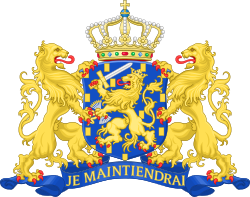| Ministerie van Sociale Zaken en Werkgelegenheid | |
 Ministry logo | |
 Ministry of Social Affairs and Employment | |
| Department overview | |
|---|---|
| Formed | 25 September 1918 |
| Jurisdiction | Kingdom of the Netherlands |
| Headquarters | Anna van Hannoverstraat 4, The Hague, Netherlands |
| Annual budget | €81.8 billion (2018) [1] |
| Minister responsible |
|
| Deputy Minister responsible |
|
| Website | Ministry of Social Affairs and Employment |
The Ministry of Social Affairs and Employment (Dutch : Ministerie van Sociale Zaken en Werkgelegenheid; SZW) is the Dutch ministry responsible for social affairs, relations between employers and employees, social security, trade unions and emancipation. It was established in 1918 as the Ministry of Labour and had several name changes before it became the Ministry of Social Affairs and Employment in 1981. The ministry is headed by the Minister of Social Affairs and Employment, currently Eddy van Hijum of New Social Contract.
Contents
| Part of the Politics series |
 |
|---|
| |
